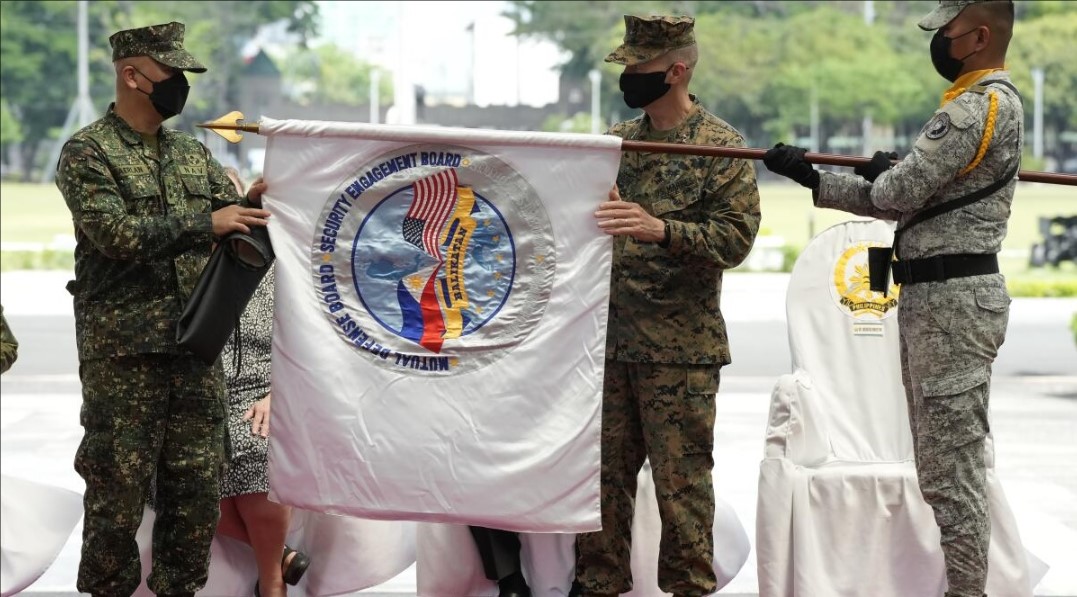Philippines Military Urged to Rapidly Evolve Against China Threat, States Defence Secretary

Philippine
Amidst escalating tensions in the Asia-Pacific, Defense Secretary Teodoro emphasizes the urgent need for the Philippine military to evolve swiftly to confront regional threats, particularly in the South China Sea, following joint exercises with the United States.
In a rapidly evolving geopolitical landscape, the Philippines finds itself facing multifaceted challenges, particularly in the Asia-Pacific region. Against the backdrop of simmering tensions, Defense Secretary Gilberto Teodoro emphasizes the imperative for the Philippine military to adapt swiftly to safeguard the principles of a "free and open" Indo-Pacific. The recent culmination of the annual joint exercises with the United States underscores the urgency of this evolution.
During the annual "Balikatan" war games, Defense Secretary Teodoro emphasized the necessity for the military to sharpen its focus on actual soldiering. Drawing a vivid analogy, he likened the military's preparedness to the sharpness of a chef's knife, stressing the need for continuous honing. This analogy encapsulates the essence of readiness in confronting diverse threats across multiple theaters.
The strategic significance of these exercises, involving American, Filipino, and Australian troops, is magnified by their concentration in areas proximate to potential flashpoints in the South China Sea and Taiwan. The South China Sea, in particular, has become a focal point of contention, with China asserting expansive territorial claims that encroach upon the sovereignty of neighboring nations, including the Philippines.
Manila's dispute with Beijing over territories in the South China Sea has escalated, marked by increased confrontations between Chinese and Filipino vessels. China's assertive actions, including the deployment of coast guard and naval vessels, underscore the gravity of the situation. Despite an international ruling dismissing China's claims, Beijing persists in its efforts to assert dominance over the region.
Amidst these challenges, Defense Secretary Teodoro reaffirms the Philippines' commitment to upholding internationally accepted norms and a rules-based international order. The term "free and open Indo-Pacific" underscores the shared goal of promoting transparency, peaceful resolution of disputes, and adherence to established norms. This alignment with the United States' strategic vision underscores the importance of collaborative efforts in addressing regional security concerns.
Lieutenant General Michael Cederholm, commander of the U.S. First Marine Expeditionary Force, emphasizes the pivotal role of joint exercises in enhancing warfighting readiness. The joint exercises not only bolster military capabilities but also serve as a deterrent to adversaries who seek to undermine the principles of a free and open Pacific. The spirit of camaraderie embodied in the Tagalog phrase "Balikatan," meaning "shoulder to shoulder," underscores the solidarity between allied forces in confronting common challenges.
The recent escalation in tensions between the Philippines and China has further underscored the complexities of regional dynamics. Manila's call for the expulsion of Chinese embassy staff accused of malign influence and interference reflects growing concerns over Beijing's assertive behavior. The absence of a formal agreement regarding disputed territories highlights the need for diplomatic clarity and resolution.
In response, Chinese authorities have called for the protection of their diplomats and urged the Philippines to cease infringement and provocation. The ongoing dispute over Second Thomas Shoal, where Filipino troops are stationed on a grounded naval ship, epitomizes the contentious nature of territorial disputes in the South China Sea. The resupply missions to the remote reef serve as flashpoints, underscoring the delicate balance of power in the region.
As tensions persist, it is imperative for the Philippines to enhance its military capabilities to effectively address emerging threats. This necessitates a multi-threat, multi-theater operating armed force capable of adapting to evolving security challenges. Investment in training, equipment, and strategic partnerships is paramount in ensuring the country's ability to safeguard its territorial integrity and uphold regional stability.
In conclusion, the evolving security landscape in the Asia-Pacific region demands a proactive approach from the Philippines. Through collaborative efforts with allies and a commitment to upholding international norms, the Philippines can navigate the complexities of regional dynamics and safeguard its interests. By prioritizing military readiness and fostering diplomatic engagement, the Philippines can effectively address emerging threats and contribute to a free and open Indo-Pacific.


